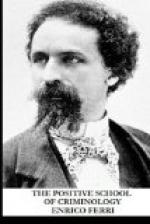This is the fundamental conviction at which the positive school arrives: That which has happened in medicine will happen in criminology. The great value of practical hygiene, especially of social hygiene, which is greater than that of individual hygiene, has been recognized after the marvelous scientific discoveries concerning the origin and primitive causes of the most dangerous diseases. So long as Pasteur and his disciples had not given to the world their discovery of the pathogenic microbes of all infectious diseases, such as typhoid fever, cholera, diphtheria, tuberculosis, etc, more or less absurd remedies were demanded of the science of medicine. I remember, for instance, that I was compelled in my youth, during an epidemic of cholera, to stay in a closed room, in which fumigation was carried on with substances irritating the bronchial tubes and lungs without killing the cholera microbes, as was proved later on. It was not until the real causes of those infectious diseases were discovered, that efficient remedies could be employed against them. An aqueduct given to a center of population like Naples is a better protection against cholera than drugs, even after the disease has taken root in the midst of the people of Naples. This is the modern lesson which we wish to teach in the field of criminology, a field which will always retain its repressive functions as an exceptional and ultimate refuge, because we do not believe that we shall succeed in eliminating all forms of criminality. Hence, if a crime manifests itself, repression may be employed as one of the remedies of criminology, but it should be the very last, not the exclusively dominating one, as it is today.
It is this blind worship of punishment which is to blame for the spectacle which we witness in every modern country, the spectacle that the legislators neglect the rules of social hygiene and wake up with a start when some form of crime becomes acute, and that they know of no better remedy than an intensification of punishment meeted out by the penal code. If one year of imprisonment is not enough, we’ll make it ten years, and if an aggravation of the ordinary penalty is not enough, we’ll pass a law of exception. It is always the blind trust in punishment which remains the only remedy of the public conscience and which always works to the detriment of morality and material welfare, because it does not save the society of honest people and strikes without curing those who have fallen a prey to guilt and crime.




